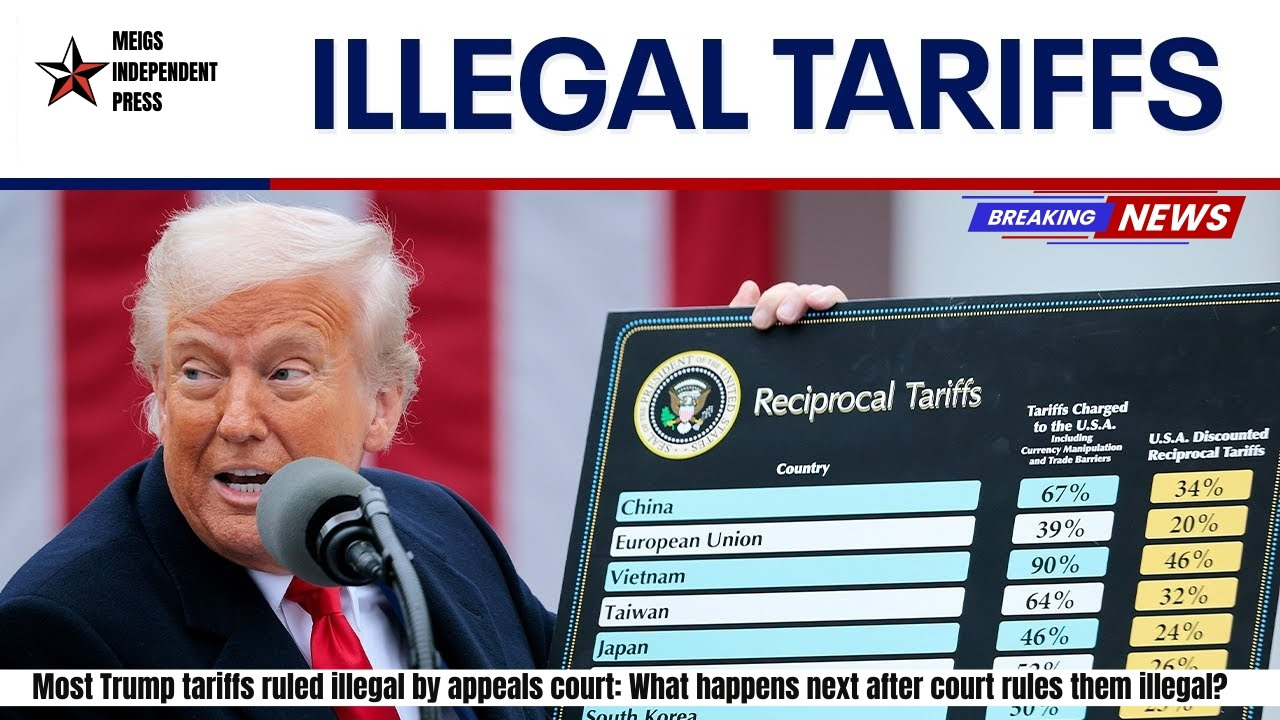A federal appeals court has determined that most of Donald Trump’s tariffs exceed the authority granted by his emergency powers as president.
The so-called reciprocal tariffs—applied to nearly every country the US trades with—were imposed illegally, the US Court of Appeals ruled on Friday.
The decision supports a May ruling from the Court of International Trade, which also dismissed Trump’s claim that his global tariffs were authorized under the Emergency Economic Powers Act.
Many of the tariffs impacted by the ruling originated from an April announcement of a flat 10% rate on imports from all countries, which Trump said would address “unfair” trade practices against the US.
The court did not immediately remove the tariffs, instead allowing them to remain in effect until mid-October, paving the way for a potential Supreme Court challenge.
While many details remain uncertain, here’s what we know so far about the ruling and its potential impact on the president’s signature trade policy.
What the Appeals Court Said
In a 7-4 decision, the appellate court sided with a lower court, finding that Trump lacked the authority to impose global tariffs.
The ruling focused on the law Trump cited to justify the tariffs—the International Emergency Economic Powers Act (IEEPA). The judges said the act does not grant “the power to impose tariffs, duties, or the like, or the power to tax.”
The US Court of Appeals rejected Trump’s claim that his emergency economic powers allowed the tariffs, calling the levies “invalid as contrary to law.”
Trump immediately criticised the decision, posting on Truth Social just hours after the ruling. He called the appeals court “highly partisan” and described the judgement as a “disaster” for the country.
“If allowed to stand, this Decision would literally destroy the United States of America,” he wrote.
What Is the IEEPA?
The decades-old International Emergency Economic Powers Act (IEEPA), which Trump used multiple times during both his terms, gives a US president broad authority to respond to a national emergency or major overseas threat.
The 1977 law allows a president to use various economic tools “to deal with any unusual and extraordinary threat, which has its source in whole or substantial part outside the United States, to the national security, foreign policy or economy.”
Both Presidents Barack Obama and Joe Biden have invoked the act, using it to impose sanctions on Russia after its illegal annexation of Crimea in 2014 and again following the full-scale invasion of Ukraine eight years later.
However, the appeals court said the emergency law “did not give the president wide-ranging authority to impose tariffs.”
The court noted that the IEEPA “neither mentions tariffs (or any of its synonyms) nor has procedural safeguards that contain clear limits on the president’s power to impose tariffs.”
Trump had argued that a trade imbalance threatened US national security and therefore qualified as a national emergency.
The court, however, ruled that imposing tariffs is outside the president’s mandate, stating that “the power of the purse (including the power to tax) belongs to Congress.”
Why This Is Important
Beyond being a major setback for a key part of Trump’s agenda, the federal appeals court ruling could immediately affect the US economy and ripple through global markets.
Tariffs are taxes that companies pay when importing certain goods from foreign countries, which can impact sales and profit margins.
“Businesses are going to be subject to uncertainty,” Dr Linda Yueh, an economist at Oxford University and the London Business School, told BBC Radio 4’s Today programme.
Tariffs aim to discourage domestic firms from buying foreign goods, directly influencing international trade.
As countries wait to see if the US Supreme Court will hear the case—which appears likely—they might delay doing business with the US. Dr Yueh said this could “dampen down economic activity.”
The ruling also carries political consequences. If the Supreme Court overturns the appeals court decision and sides with the Trump administration, it could set a precedent allowing the president to use the IEEPA more aggressively than in the past.
What Happens Next
The case will likely move to the US Supreme Court, a step Trump hinted at on Truth Social.
“Tariffs were allowed to be used against us by our uncaring and unwise Politicians,” Trump wrote. “Now, with the help of the United States Supreme Court, we will use them to the benefit of our Nation, and Make America Rich, Strong, and Powerful Again!”
The Supreme Court’s conservative majority could make it more likely to side with the president’s perspective. Six of the nine justices were appointed by Republican presidents, including three chosen by Trump during his first term.
However, the court has also pushed back against presidential overreach on policies not explicitly authorised by Congress.
For example, during Joe Biden’s presidency, the court applied the “major questions doctrine” to block Democratic efforts to limit greenhouse gas emissions from power plants and to cancel student loan debt for millions of Americans.
What If the Tariffs Are Ruled Illegal
The federal appeals court ruled 7-4 that Trump’s nearly universal tariffs are illegal, giving the US administration until mid-October to appeal to the Supreme Court. The case carries major implications for both the US economy and its trade relationships worldwide.
If the Supreme Court upholds the decision, financial markets could face significant uncertainty.
Questions may arise over whether the US must refund billions of dollars collected through import taxes on affected products.
The ruling could also cast doubt on whether major economies—including the UK, Japan, and South Korea—remain bound by the individual trade deals they secured with the US before the August deadline. Other trade agreements currently under negotiation could face disruption as well.
If the appeals court ruling stands, it would deal a major blow to Trump’s political authority and reputation as a dealmaker. If the Supreme Court overturns it, the opposite effect could strengthen his standing.
Are There Still Tariffs in Place
The ruling targets Trump’s “reciprocal tariffs,” a mix of rates applied to most countries worldwide, including taxes on products from China, Mexico, and Canada.
These levies on nearly all goods from almost every US trading partner will remain in effect until mid-October.
After October 14, the appeals court said, they will no longer be enforceable.
Separately, tariffs on steel, aluminium, and copper—imposed under a different presidential authority—will remain in place and are not affected by this ruling.








Leave a Reply